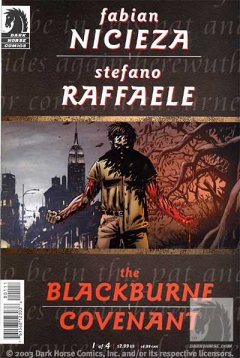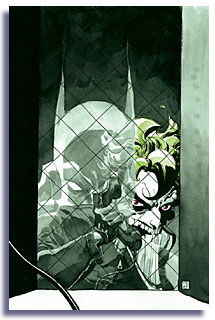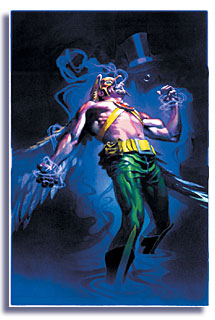|
Hey
Kids! Comics!
Alias
#21
writer: Brian Michael Bendis
artist: Michael Gaydos
While
Marvel confirms that yet again they've saved Spider-Girl
from cancellation, Bendis has been quietly making all the
Spider-Women into the characters really worth reading about.
Though their tenure in the pages of Alias appears to
be over, they're more memorable than they ever were in their
own titles.
Of course,
this book still has something to do with Jessica Jones, and
her story has also heated up. With a little help from guest-artist
Mark Bagley (Bendis' books sure do get incestuous) on flashbacks,
tantalizing glimpses of Jessica's Jewel days appear.
Apparently,
she worked with The Defenders as well as The Avengers. And
considering how ill-fated her superhero career seems to have
been, that teaming makes more sense.
Overall
this arc, "The Underneath," has brought the book tighter into
the regular Marvel Universe. We get a sense of the final fate
of the most recent Spider-Woman, current Avenger Ant-Man is
firmly established as Jessica's boyfriend, and, with Bagley's
art, we see Jessica in four-color glory.
All this
and Speedball, too. This truly is the book for Marvel's third-tier
characters to find a strange afterlife, and maybe even a little
dignity.
Perhaps
the greatest contribution, though, lies in Bendis' invention
of Mutant Growth Hormone. An insidious drug, its appeal to
normals is obvious. But it's the unflinching look at what
the drug costs its source that makes it particularly ugly
and memorable. Suddenly I wonder where HGH, which I hear touted
on the radio all the time, comes from.
Rating:

The
Blackburne Covenant #1
writer: Fabian Nicieza
artist: Stefano Raffaele
For Dark
Horse Comics' latest foray into horror, the publisher turned
to (or accepted a pitch by) their Buffy The Vampire Slayer
writer Nicieza. Teamed with Italian artist Raffaele, the result
is dark and moody, but not yet as creepy as they hoped it
would be. Nor does it stray as far from the Buffy formula
as I'd like.
The premise
is intriguing enough. Richard Kaine has written a medieval
romance (or so it seems to be) that becomes a runaway best-seller.
Covering a battle between a Wicca coven and Christian land
barons, the novel, Wintersong, apparently has a wistful
tone over the possibilities lost when the Wiccans are crushed.
Whatever
the subject matter, Kaine considers it a flight of his fancy,
merely grateful that it has catapulted him into fame and fortune.
In a savvy touch on Nicieza's part, fans of the book believe
that it has to be non-fiction, revealing a hidden history
of the world. Kaine knows better. According to him, he "…wouldn't
know the Monroe Doctrine from Marilyn Monroe."
But what
if something dictated this history to his unconscious?
And something else is very unhappy that the truth has been
revealed.
First
triggered by a bottle of Remy Martin, Kaine begins hallucinating.
Then in a scuffle with someone bearing the markings of one
of his characters, Kaine displays fighting skills he simply
shouldn't have.
Unfortunately,
this aspect smacks of The Slayer; whatever gave Kaine knowledge
has also given him power. Instead of vampires, we seem to
have Templar Knights, called in Kaine's book The Blackburne
Covenant. It's still told compellingly enough, with Nicieza
withholding a lot of plot secrets - specifically just what
secret the covenant does not want told.
Like
Buffy, though, this horror tale smacks just a little
bit too much of superheroics. And in a hurry to set up his
situation, Nicieza rushes much of this issue.
Bringing
in Raffaele, though, was a great move. He makes much of the
mood work, and the first two pages detailing the end of Kaine's
novel have a great feel to them.
Coupling
this with Hellboy Weird Tales, Dark Horse's horror
line is off to an intriguing start. But can the market bear
something merely intriguing? I hope that Dark Horse has enough
time to let it blossom. Into a dark red, bloody, man-eating
flower older than time itself.
Rating:

Daredevil
#45
writer: Brian Michael Bendis
artist: Alex Maleev
Mutant
Growth Hormone rears its ugly head again this week. Granted,
it's still in a book by Bendis, but here the MGH trade seems
so matter of fact that you could easily see this drug taking
over the streets. Of course, Daredevil can't let that happen.
Another
arc draws to a close, and a shadow looms large for the next
one. In the meantime, Bendis has brought another formerly
lame DD villain firmly into the 21st Century. I still think
some explaining needs to be done as to what exactly changed
The Owl to the savage personality he has become, but it's
welcome.
Finally,
too, Foggy Nelson gets to stop being the whiny girlfriend
the last year or so has made him. In a tender scene between
he and Matt, Foggy unburdens himself of guilt, perhaps the
last barrier to Matt's acceptance of his own role as Daredevil.
Both
men have been fleshed out by Bendis, sometimes not likably
so. But that's what makes them all the more real, not just
the almost photorealistic art by Maleev.
As "Lowlife"
ends, most things have returned to a slightly uneasy balance.
While over in Amazing Spider-Man, Straczynski experiments
with the idea that the world might be better off without superbeings,
Bendis offers that they can be cool. Even if they sometimes
creep us the heck out.
Rating:

Detective
Comics #781
writer: Ed Brubaker
artists: Tommy Castillo and Wade von Grawbadger
Let me
partially eat my words from last
month's review. Mystery villain Paul Sloan, now dubbed
The Charlatan by DC editorial, isn't a barely veiled rip-off
of other Bat-villains. Instead, he's a recasting of a Golden
Age staple of the Two-Face mythos.
For a
time in the forties, Harvey Dent had undergone successful
plastic surgery. Mindful that he had a pretty good villain
gone to waste, writer Bill Finger set up a fake Two-Face…an
actor hired to play Dent on a television broadcast, tragically
scarred in a recreation of the accident that first birthed
Two-Face. (Comics are big on such coincidences.)
That
actor's name? Paul Sloan. Until The Joker started telling
his tale in this issue, I'd completely forgotten.
So I
hereby admit Brubaker snuck one past me, and instead of chastising
him for it, I should applaud him for giving new life to old
continuity. Except he still seems a lot like The Film Freak.
But Sloan
has an entirely different agenda than he used to have. Not
content to recreate the career of Two-Face, he seems bent
on eliminating Harvey's competition, then Harvey himself.
The Joker, however, seems exempt, but then, we knew that.
Brubaker
is not interested in answering the impending question from
Loeb and Lee: why doesn't Batman just kill The Joker? Instead,
he gives a pretty good battle of wits and physical skill between
the two, with Castillo and von Grawbadger doing a good pastiche
of Mr. J's late 40's, early 50's appearance. This Joker isn't
necessarily insane, but he is deadly.
In the
back-up slot, Jon Lewis and Stefano Gaudio contribute an Elseworlds
tale called "Gottismburgh" So far, it's interesting, combining
the legend of The Bat with that of Robin Hood, possibly in
a post-apocalyptic medieval setting. Pouring that many high
concepts into one is at least good for a couple of smiles.
Rating:

Hawkman
#14
writer: Geoff Johns
artists: Don Kramer and Prentiss Rollins
Many
of the undercurrents running through this series have finally
come to a head. For many months, Carter Hall has been wrestling
with his own know-it-all attitude and the clear evidence (both
here and in JSA) that in past lives, his sense of justice
was something very different from its modern incarnation.
Ironically,
he externalizes this struggle to Kendra this issue, and ends
up on both sides of it himself. More importantly, we see the
consequences of past life rashness, giving a heretofore unseen
depth to a long-time Hawk foe, The Gentleman Ghost.
When
James Robinson did a "Past Lives" that vaguely involved Gentleman
Jim Craddock, it seemed like a pale copy of Robinson's work
on Starman. Here Johns fleshes the story out, and gives
his sometime writing partner's story resonance.
The Gentleman
Ghost has a completely deserved rage towards Hawkman that
separates him from Starman's immortal adversary/ally, The
Shade. Until the Hawks' reincarnation cycle stops (and from
all evidence, it never will), Craddock is stuck, unable to
move on to his final reward or punishment, nor even able to
reincarnate himself.
And just
as we digest that, Johns throws in another curve with that
final page. One of a handful of writers who really, really
know how to utilize the cliffhanger, Johns gives us an obvious
development, but it's still cool.
Guest
artists Kramer and Rollins bring an interesting look to the
issue, though it's not quite as uniform with Morales and Bair's
art as last issue's guests did. Some panels look a little
rushed, but it's still good work.
Rating:

|









